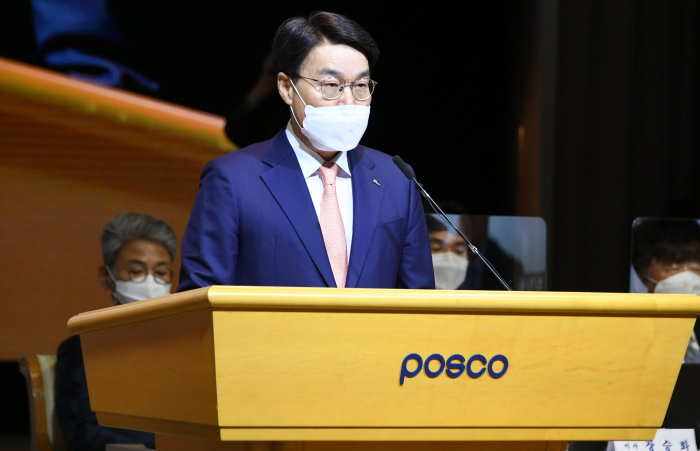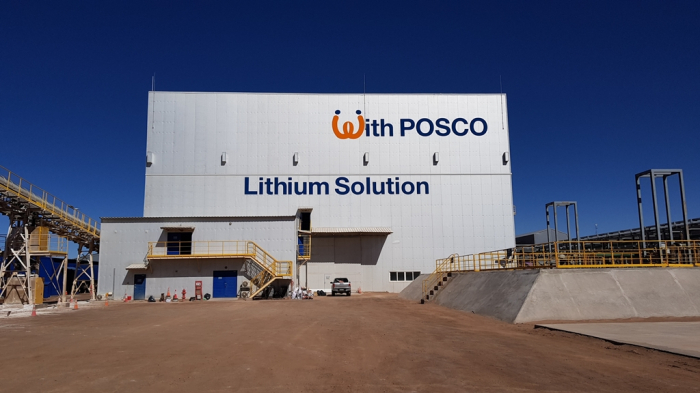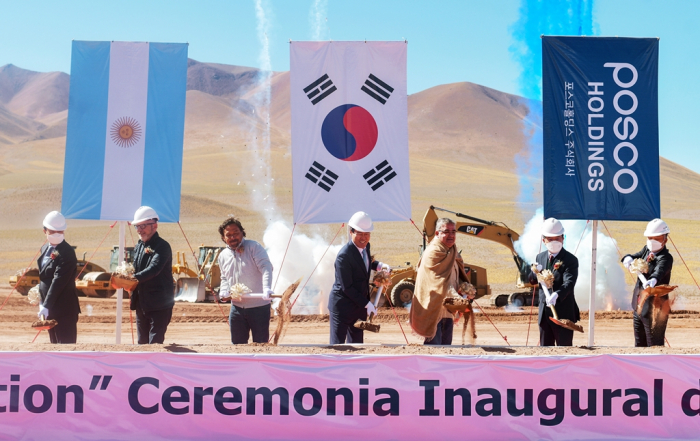Corporate strategy
POSCO to comply with IRA rules to access battery tax breaks: chairman
The steel giant is setting its sights on battery materials to overcome a growing trend of trade protectionism
By Jun 01, 2023 (Gmt+09:00)
3
Min read
Most Read
LG Chem to sell water filter business to Glenwood PE for $692 million


KT&G eyes overseas M&A after rejecting activist fund's offer


Kyobo Life poised to buy Japan’s SBI Group-owned savings bank


StockX in merger talks with Naver’s online reseller Kream


Meritz backs half of ex-manager’s $210 mn hedge fund



NEW YORK – POSCO Group, which owns South Korea’s largest steelmaker, has been striving to transform into a low-carbon conglomerate by shedding its decades-old image as a major corporate greenhouse gas emitter.
As part of such efforts, the steel giant last year launched a holding company, POSCO Holdings Inc., with a vision to become a company focused on eco-friendly materials and with half of the group profits coming from non-steel business, up from the current 20%.
POSCO Holdings, the parent of group affiliates including a steelmaker, a battery materials producer, energy firms and chemical manufacturers, now hopes to take advantage of subsidies and tax breaks in advanced countries to tide over a growing global trend of resource nationalism.
“In the wake of the (COVID-19) pandemic, every country cares about its own industries, naturally leading to the strengthening of trade protectionism. We’ll actively enhance our technology competitiveness, particularly in rechargeable batteries, battery materials and the hydrogen business,” said POSCO Group Chairman Choi Jeong-woo during a video conference with Kathleen Stephens, board chair of the Korea Society, on Wednesday.
“Within a decade, we aim to become a leader in the eco-friendly, future energy material business,” he said.
Based in New York, the Korea Society is a nonprofit organization that promotes understanding and cooperation between the US and Korea. Stephens, who served as US ambassador to Korea from 2008 to 2011, is currently the president of the Korea Economic Institute of America.

THREATS TO BUSINESS
Choi, chief executive of POSCO Holdings, cited the global financial market volatility and geopolitical risks linked to growing protectionist movements in the US and Europe as key threats to its business.
“Aggressive investments are crucial to keeping up with the changing business environment. The current uncertainty in the global financial market is a big burden for us,” said the POSCO leader. “We plan to hoard cash while trying to cut operating costs.”
Regarding US tax credits for EVs, batteries and battery materials under the Inflation Reduction Act (IRA) and similar protectionist measures announced by European countries, he said POSCO will comply with those rules.
“Half of our steel business sales come from abroad. We also rely heavily on overseas projects for the procurement of secondary battery materials. It is important to align ourselves with the trade conditions of the major markets, namely the US and Europe,” he said.
The chairman said the company is particularly keen to know whether raw battery minerals such as lithium and nickel that POSCO sources from Argentina and Indonesia are subject to tax breaks under the IRA rules.

CARBON NEUTRALITY
“Carbon neutrality will be the name of the game at POSCO Group. We’ll turn into an eco-friendly company by 2030,” Choi said at a ceremony marking the merger of POSCO International Corp. and POSCO Energy Co. in April.
The merged entity will strengthen its business portfolio covering steel, food and battery materials as well as its mainstay eco-friendly energy business, he said.
Earlier this year, the conglomerate announced seven key business sectors to drive its future growth, including battery materials, hydrogen, energy, food and steel.
Write to Jae-Kil Cho at road@hankyung.com
In-Soo Nam edited this article.
More to Read
-

-
 Electric vehiclesPOSCO International to set up EV parts factory in Poland
Electric vehiclesPOSCO International to set up EV parts factory in PolandMay 15, 2023 (Gmt+09:00)
2 Min read -
 SteelPOSCO to supply steel to Samsung Electronics under long-term contract
SteelPOSCO to supply steel to Samsung Electronics under long-term contractApr 25, 2023 (Gmt+09:00)
2 Min read -
 Corporate strategyPOSCO International to transform into green company by 2030
Corporate strategyPOSCO International to transform into green company by 2030Apr 13, 2023 (Gmt+09:00)
1 Min read -
 War in UkraineKorea jittery over oil, gas, commodity weaponization
War in UkraineKorea jittery over oil, gas, commodity weaponizationMar 13, 2022 (Gmt+09:00)
4 Min read -
 Corporate restructuringPOSCO launches holding firm to develop non-steel biz
Corporate restructuringPOSCO launches holding firm to develop non-steel bizMar 02, 2022 (Gmt+09:00)
2 Min read
Comment 0
LOG IN


